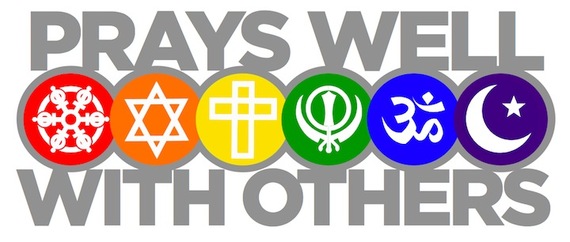
Source: State of Information
There's been a lot written about some of the positives and negatives of having interreligious relationships, dialogue, foundations, organizations, and other groups in an increasingly multicultural world; two great things about interreligious contact are deepening one's perspectives on the world and getting to know one's immediate and global neighbors on a deeper personal level. Even with the positives, other people argue that having the aforementioned contacts are impossible due to irreconcilable differences (see Huntington's "clash of civilizations arguments) and that it is impossible to reduce one's religious teachings down in order to make them like other teachings; while the concerns of those who do not participate in interreligious contact (hereafter called religious exclusivists) are valid and will be addressed in the following article, I think one of the best ways to have an enriching and meaningful interreligious experience is through the process of prayer.
At first glance, the idea of having an interreligious prayer might seem disingenuous and perhaps even insulting; one might ask whether or not the prayer is truly "meaningful": does the language used reflect how one understands their idea and conceptualization of the divine? What words can and should be avoided? Other issues can revolve around who is and is not present at the prayer: can Christians, Jews, and Muslims pray at the same event without political differences become overwhelming? What about Hindus and Muslims, Buddhists and Muslims, and so on? Finally, another issue that must be addressed is whether or not a "prayer" can or does include persons who identify as secular or as non-theists: is it possible to craft language that is inclusive of all beliefs present? How can one view the presence of secular and non-theist persons in a religious context?
If none of the aforementioned questions have scared you off yet (or even if they have), it's okay; sometimes the most difficult part of moving into interreligious contact is knowing how to do it. While most people think of interreligious contact as something that involves organizations, governmental think tanks, charities, and other large groups, the truth is that each person likely already knows someone of a different religious background. According to a recent study done by the Pew Research Center, the religious landscape in the United States has been shifting to more ethnically and racially diverse branches of Christianity, a decline in Christian beliefs overall, and the rise of "nones" (persons who identify as secular, non-theist, or as no religion at all) among other changes. Based on the research that has already been conducted, one can confidently assume that their neighbors, coworkers, classmates, and even family members will identify with different religious beliefs or lack thereof.
In order to have contact that is enriching and meaningful, a prayer (or perhaps moment of reflection and/or silence) that is framed around interreligious grounds must be deliberately thought out and discussed among members of a group; for example, a group of five might ask one another to think of concepts such as social justice, the alleviation of poverty, economic well-being, safety, the prevention of war, medical care, and other circumstances and then try and find passages, teachings, or quotations from figures in their own traditions.
If a group decides to conduct a prayer or moment of reflection/silence around any of the aforementioned topics, Christians could use the teachings of Jesus, Jews could use passages from the prophets, Muslims could use the teachings of Muhammad, Buddhists could use the thoughts of the Buddha, Hindus could use teachings from the Upanishads, and secularists could use writings from philosophers and ideologues from any period of human history. While using some of the aforementioned sources can be problematic (some passages could be interpreted as denigrating, offensive, or disrespectful to other groups of people), one recommendation is that leaders and/or participants in the prayer or moment of reflection/silence "make clear that each of us have our glimpses of God, our experiences of the divine or of sacred truth, whom none of us can know fully" (Lobenstine, "Dialogue through Participation," 84).
The planning and preparation of an interreligious prayer or moment of reflection/silence requires deliberate planning; leaders should consult one another when decided who should be invited to contribute to the spoken words and what groups can and should be present; while it would be ideal to have as many groups as possible present, it can be overtly idealistic to ignore the logistics and practical concerns of groups that cannot participate due to time, distance, budgetary constraints, and personal beliefs. Using words that are general and non-specific can be read as "cheapening" the perception of the divine, but we must also keep in mind that our languages for the divine are already limited because human beings are limited. Lastly, and perhaps most importantly, one of the most important ways to develop and create something meaningful is to come to one another with open arms and understanding; leave political discussions out of things (if possible) and realize that you will be staring at, embracing, and talking to people who are your brothers and sisters. Treat others the way that you would hope to be treated and realize that religious freedom applies to all persons, not just those in power.
References
"America's Changing Religious Landscape." Pew Research Center of Religion & Public Life. May 12 2015. http://www.pewforum.org/2015/05/12/americas-changing-religious-landscape/.
Lobenstine, Rev. Dr. Clark. "Dialogue through Observation and Participation-Interfaith Prayer Service." In InterActive Faith: The Essential Interreligious Community-Building Handbook, edited by Rev. Bud Heckman with Rori Picker Neiss, 77-107. Woodstock, VT: SkyLight Paths Publishing, 2008.